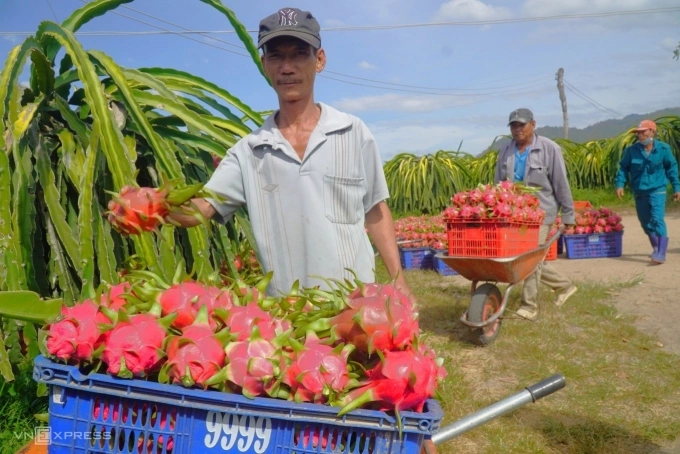All 10 biggest markets saw declines in purchase, with China, the biggest buyer, spending $15 million, down 60% from May, according to Vietnam Customs.
Indian, the U.S. and United Arab Emirates bought between 48% and 57% less.
Overall, dragon fruit exports in the first six months fell 1.5% year-on-year.
Huynh Canh, chairman of the Binh Thuan Dragon Fruit Association, attributed the significant export decline to supply constraints.
Unfavorable weather in May and June caused fungal diseases and crop damage, resulting in many shipments failing to meet quality standards, he said.
 |
|
A farmer collects dragon fruits in Binh Thuan Province, February 2022. Photo by VnExpress/Viet Quoc |
Dang Phuc Nguyen, General Secretary of the Vietnam Fruit and Vegetable Association, highlighted increased competition in the global market.
As China, India, and some South American countries entered harvest season, Vietnamese dragon fruit struggled to compete in price, he added.
Additionally, changes in the authority issuing food safety certificates for the European Union market have further complicated exports to this region.
A new circular effective July 1 moved the responsibility for issuing food safety certificates for E.U.-bound shipments from the Department of Crop Production and Plant Protection to provincial People’s Committees.
This certificate is mandatory to meet the E.U.’s stringent quarantine requirements.
The circular mandates that within one working day of receiving valid documents, the designated agency must review them.
These changes followed a major merger of provinces in Vietnam, reducing the total number from 63 to 34.
Export companies have reported that the transition has disrupted the certification process for approximately 10 days, forcing many dragon fruit shipments to remain in cold storage awaiting approval.
This delay posed challenges for exporters, given the E.U.’s strict quarantine standards and tight delivery schedules.
Canh said that by July 25, over 100 tons of dragon fruit had spoiled due to prolonged storage, with an additional 50-70 tons still awaiting certification.
The issue stemmed from no provincial authority yet taking responsibility for confirming food safety for E.U.-bound shipments, he explained.
Since July 26, the issuance of certificates has begun to be resolved, alleviating some delays, but many businesses had already incurred significant losses.
In response, Prime Minister Pham Minh Chinh recently directed relevant agencies to address bottlenecks in issuing food safety certificates, particularly for thousands of tons of dragon fruit and pepper stuck in cold storage, unable to be exported to the E.U.
He tasked provincial People’s Committees with coordinating with ministries and agencies to resolve difficulties for businesses, emphasizing the need for synchronized solutions to ensure timely customs clearance and minimize impacts on Vietnam’s export reputation and capacity.





